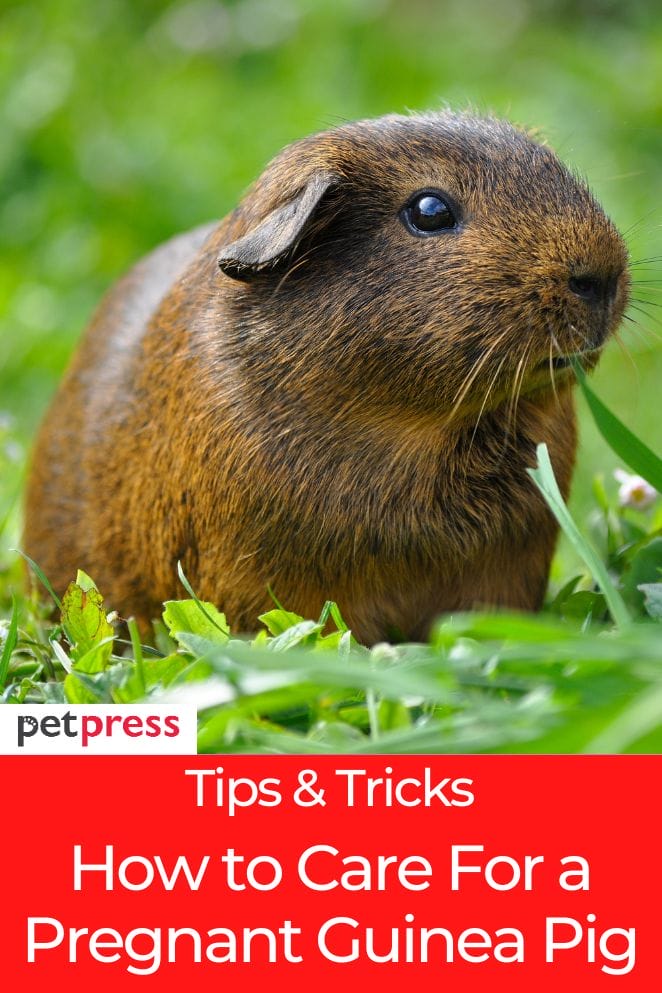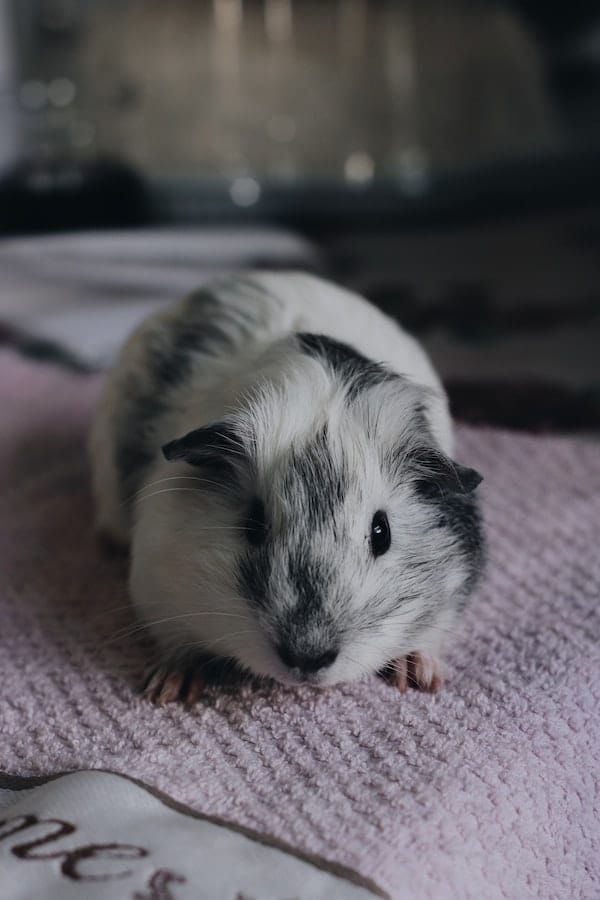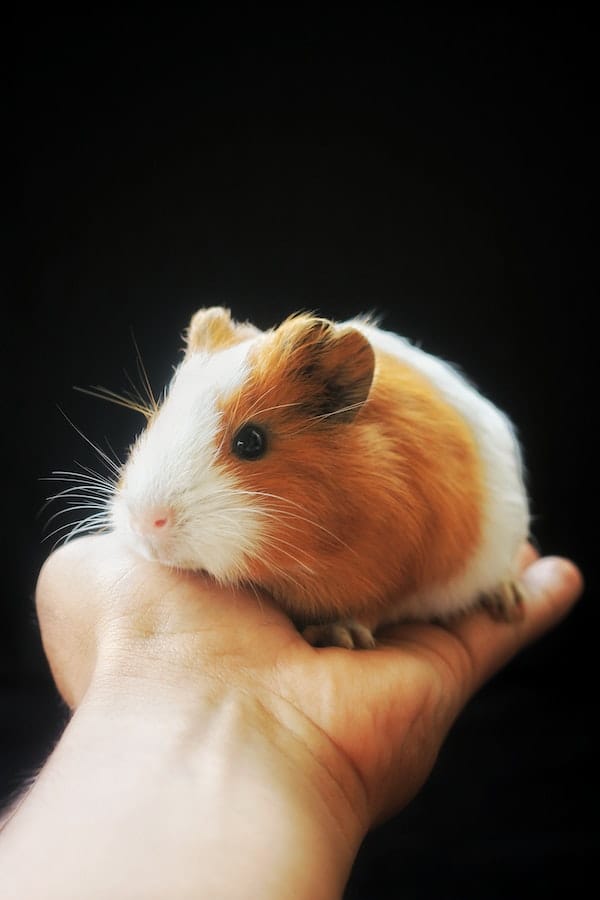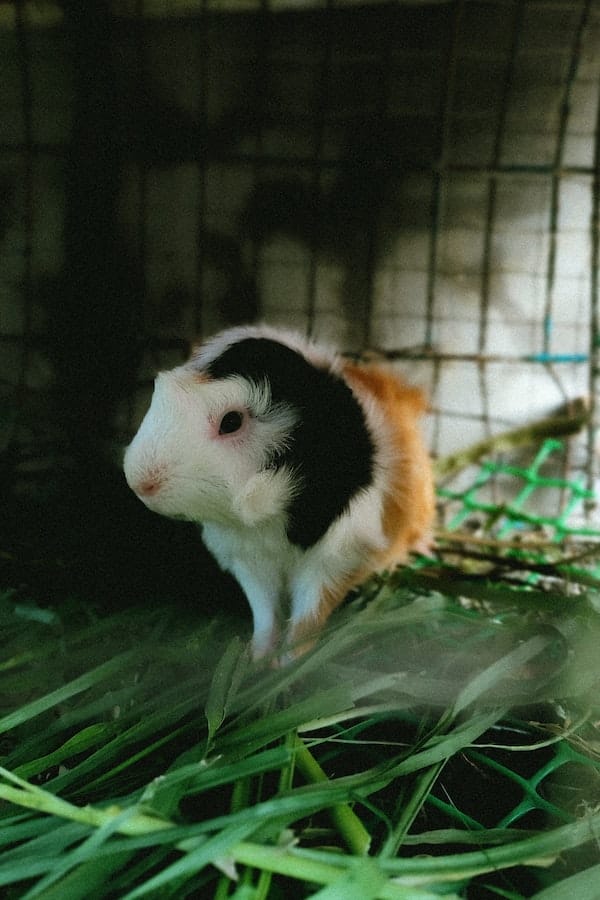
Caring for a pregnant guinea pig can be an exciting and rewarding experience.
It is important to give your pregnant guinea pig the best care possible so that she has a healthy pregnancy, birth, and raising of her young.
You can take several steps to ensure your guinea pig has the healthiest possible pregnancy.
By following these guidelines, your pregnant guinea pig will have the best start to life possible!
Diet for a pregnant guinea pig

Just like with humans, a pregnant guinea pig’s diet needs to be adjusted to meet her growing needs. These includes:
Increase in calories and nutrients
Pregnant guinea pigs will need to increase their calorie intake by 25-50%, as well as their nutrient intake. Make sure you are feeding your pregnant guinea pig a high-quality diet that is rich in vitamins and minerals, such as hay and fresh fruits and vegetables. Additionally, you may want to supplement her diet with pellets specifically formulated for pregnant guinea pigs.
Provide plenty of fresh water
It is important to make sure your pregnant guinea pig has access to a constant supply of fresh, clean water at all times.
Make sure to change her water regularly, as the quality and taste can degrade over time.
Having plenty of fresh water available will also help to keep her hydrated and energized throughout the day.
Types of food to offer
In addition to hay and fresh fruits and vegetables, there are also several types of food you can offer your pregnant guinea pig. These include:
- Pellets that are specifically designed for pregnant guinea pigs
- Oat grass
- Timothy hay cubes
- Alfalfa hay cubes
- Other leafy greens.
Additionally, you may want to offer her a few treats throughout the day such as nuts, seeds, or even some cooked grains.
Be sure not to overfeed your guinea pig as this can lead to weight gain and other health problems.
Amounts to feed daily
When it comes to feeding your pregnant guinea pig, the amount you give her will depend on her size and activity level.
Generally speaking, a pregnant guinea pig should eat between 1/4-1/2 cup of pellets per day as well as an ample supply of hay, vegetables, and other leafy greens.
Additionally, treats should not exceed 10% of her daily caloric intake. It is important to monitor your guinea pig’s weight as well to make sure she is getting enough but not too much food.
Exercise for a pregnant guinea pig

Just like with her diet, a pregnant guinea pig’s exercise needs will change throughout her pregnancy. These include:
Playing with toys
Playing with toys is an important part of a pregnant guinea pig’s exercise routine.
Toys not only provide physical activity, but they also help to stimulate their mental health by providing them with something to do.
You can find a variety of tunnel and ball toys specifically designed for guinea pigs in pet stores or online.
When selecting toys, be sure to choose ones that are safe for your guinea pig and made from non-toxic materials.
Additionally, be sure to supervise your guinea pig while playing with the toys to ensure they do not chew on or swallow any pieces of them.
Exploring new areas in her cage
Exploring new areas in their cage is a great way to provide mental stimulation and physical activity to your pregnant guinea pig.
Offer them a variety of enrichment items, such as tunnels, cardboard boxes, or even hay cubes, that they can explore.
This will help keep them entertained and encourage them to move around their cage.
Additionally, you can also offer your guinea pig a few toys that they can push around the cage or hide treats in for them to find.
This will help keep her mind and body active throughout her pregnancy.
Walking on a leash outside
Walking on a leash is a great way to provide your pregnant guinea pig with some fresh air and exercise.
You can purchase a small animal harness and leash from most pet stores or online.
When walking your guinea pig, be sure to take it slow at first and let her get used to the new environment.
Additionally, be sure to supervise your guinea pig at all times while she is outside and keep her in a safe area that is free of predators or other dangers.
This will help ensure she has a pleasant and stress-free experience while exploring the outdoors.
- Related post: 8 Reasons to Have Guinea Pigs as Pets
- Related post: 10+ Interesting Guinea Pig Facts For All Guinea Pig Lovers
Nesting and birthing preparations

Once your guinea pig is close to her due date, it is important to start preparing for her nest and birthing area.
Preparing the cage for nesting
Preparing the cage for nesting is an important step in preparing your pregnant guinea pig for her birthing process.
Start by setting aside a designated area of the cage that she can use as her nesting space.
This should be an area with plenty of soft bedding such as hay, straw, or shredded paper towels so she can create a comfortable and secure birthing area.
Additionally, you should also provide her with nesting boxes or cardboard tubes for her to hide in and a few extra blankets for added warmth.
Supplying comfortable bedding material
It is also important to supply your guinea pig with a comfortable bedding material for her nest. Make sure the bedding is soft, absorbent, and easy to clean.
Avoid using any materials that might be too rough or irritate her skin, such as shredded newspaper or paper towels.
Additionally, make sure the bedding is free of parasites and other dangerous organisms that could harm your guinea pig or her babies.
Providing a warm and safe environment
Once you have prepared the nesting area, it is important to provide a warm and safe environment for your guinea pig to give birth in.
The ideal temperature for guinea pig birthing is between 65-70 degrees Fahrenheit.
You can achieve this temperature by placing a heating pad in the nesting area and monitoring it with a thermometer to ensure it is at the correct temperature.
Additionally, make sure the nesting area is free of any drafts or other sources of cold air that could harm your guinea pig or her babies.
Ensuring a quiet environment
When preparing for your guinea pig’s birthing, it is important to make sure the environment is as quiet and stress-free as possible.
This means keeping the noise level low in her cage and avoiding any sudden movements or loud noises that could startle her during the birthing process.
Additionally, it is a good idea to keep any other pets away from the nesting area as much as possible, so your guinea pig can focus on birthing in peace.
By taking these steps to ensure a comfortable and stress-free environment for your pregnant guinea pig, you can help make her birthing process smoother and easier.
Conclusion
Pregnant guinea pigs need special care and attention during their pregnancy to ensure a healthy and successful birthing process.
Some important steps for preparing for your guinea pig’s delivery include providing her with plenty of exercises, setting up a comfortable nesting area with warm bedding material, ensuring the environment is quiet and free of stressors, and providing her with a warm and safe birthing area.
Taking these steps will help ensure that your guinea pig has a pleasant and successful birthing experience.
- Does Cat Litter Melt Ice? The Complete Guide to Winter Safety - January 30, 2026
- Happy Tail Dogs: Understanding This Common Canine Condition - January 29, 2026
- How Cold Can Outdoor Cats Handle? Feline Winter Safety - January 27, 2026


GIPHY App Key not set. Please check settings